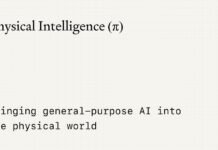Physical Intelligence Secures $600 Million to Revolutionize Robotics AI
A Major Funding Breakthrough
In a significant development for the robotics industry, Physical Intelligence, a startup focused on robotic AI, has successfully raised $600 million in funding. This funding round has catapulted the company’s valuation to an impressive $5.6 billion. The investment was led by Alphabet’s CapitalG, with contributions from notable investors like Lux Capital, Thrive Capital, and Jeff Bezos, among others. Founded in 2024, Physical Intelligence aims to redefine how robots perceive and interact with their environments through advanced AI algorithms.
A Foundational Team with a Vision
Physical Intelligence is spearheaded by a team of former researchers from Google DeepMind and experts from Stanford University and the University of California at Berkeley. This diverse background equips the company with a wealth of knowledge in both artificial intelligence and robotics, positioning it to tackle significant challenges in physical automation. Under the visionary leadership of Chief Executive Karol Hausman, the company is focused on developing core technologies that can transform the robotics landscape.
Pioneering AI Algorithms for Robotics
At the heart of Physical Intelligence’s mission is the development of AI algorithms that serve as the "brains" of robots. These algorithms aim to create a general intelligence system that can adapt to a variety of tasks and applications. Unlike traditional robotic programming, which often confines robots to specific functions, this innovative approach allows for a more flexible and capable robotic operation.
Navigating the Challenges of Robotics AI
Robotics AI presents unique challenges, particularly in adapting to physical environments. Unlike AI applications tailored for chatbots such as ChatGPT, robots must integrate a wide range of input data, particularly visual information. This multimodal approach enables robots to accurately perceive their surroundings, interpret various physical conditions, and make informed decisions regarding movement and interaction.
Hands-On Testing of AI Capabilities
Although Physical Intelligence has not yet launched any commercial products, the company is actively testing its AI software using robotic arms. These tests involve practical tasks such as folding clothes, assembling boxes, and preparing coffee. Such experiments are crucial for demonstrating the software’s potential in real-world applications, showcasing its ability to handle complex manipulation tasks.
Introducing a New Vision AI Model
Recently, Physical Intelligence unveiled a groundbreaking vision AI model based on reinforcement learning principles. This learning method allows models to iteratively improve their performance by learning from past experiences. As a result, the AI can optimize its actions over time, enhancing efficiency and accuracy without the need for explicit programming for every possible scenario.
Proven Results: Doubling Throughput
In a recent demonstration shared on X, the company showcased its robotic arms utilizing the new reinforcement learning model. The results were impressive: the robotic arms managed to double their throughput, completing tasks at a significantly accelerated pace. In a controlled three-hour test, the robotic arms accomplished each task in an average of just three minutes.
Data Acquisition: The Key to Success
Physical Intelligence recognizes that robust data acquisition is essential for developing effective AI models. The company has allocated significant resources to collecting real-world data, a critical component for training its algorithms. During its previous $400 million funding round, it identified the challenge of obtaining large-scale multitask and multirobot data as a priority. To address this, the company conducts experiments to generate proprietary datasets, ensuring a self-sustained improvement in training resources.
Addressing Limitations of Current Robotic Systems
Current robotic systems often exhibit limitations in their flexibility. Designed for specific tasks in controlled environments, these robots struggle to adapt to complex and disorganized spaces, such as residential areas or outdoor environments. Physical Intelligence aims to overcome these constraints by integrating general intelligence into its algorithms, making robots more adaptable and effective in diverse settings.
Learning from Experience: The Future of Robotics AI
The general intelligence framework developed by Physical Intelligence allows robots to learn from their experiences and adapt to various environments and tasks. This capability is crucial for enabling robots to operate effectively in real-world conditions, moving beyond rigid programming to a more autonomous functionality. By fostering adaptability, the technology opens up broader deployment possibilities in practical applications.
Competitive Landscape: Major Players in Robotics AI
Physical Intelligence is not alone in its quest to advance robotic AI. Established technology firms are also making significant strides in this space. Google, through its subsidiary Intrinsic, recently announced a partnership with Foxconn to enhance automation in smart factories. Meanwhile, Meta Platforms has developed AI tools that include Segment Anything computer vision models, facilitating object detection and segmentation.
Amazon’s Role in Robotics AI Development
Amazon has been actively incorporating AI-enabled robots into its logistics and warehouse operations. The company regularly upgrades its systems to improve tasks like sorting and transportation. These implementations highlight the pivotal role AI plays in enhancing efficiency within large-scale facilities, demonstrating the industry’s commitment to elevating robotic capabilities.
Emerging Startups in Robotics AI
Numerous startups are also entering the robotics AI arena, each focusing on unique applications. Recent examples include Gecko Robotics, specializing in inspection technologies, and Genesis AI, which emphasizes autonomous systems. Other entrants like Cobionix and FieldAI are targeting drone-based solutions and agricultural automation respectively. The influx of investment in these companies reflects a growing interest in innovative robotic applications.
The Path Forward for Physical Intelligence
With its recent funding and technological advancements, Physical Intelligence is positioned to lead the charge in reshaping how robots operate. As the company continues to refine its algorithms and expand its capabilities, it aims to set new standards in the robotics industry. The integration of AI into robotic systems promises to usher in a new era of automation, with applications spanning various sectors.
Anticipating Future Developments
As Physical Intelligence moves forward, the industry will be watching closely to see how its innovations unfold. The company’s commitment to developing adaptable and intelligent robotic systems could change the landscape of automation, making it more accessible and effective across various domains.
Conclusion: A New Era of Robotics Awaits
In summary, Physical Intelligence’s recent funding and groundbreaking advancements in robotics AI signal a transformative shift in the industry. With a focus on creating adaptable algorithms and leveraging real-world data, the company is set to redefine the capabilities of robots. As technological boundaries continue to expand, we are on the cusp of a new era in automation, with Physical Intelligence at the forefront of this exciting evolution.







